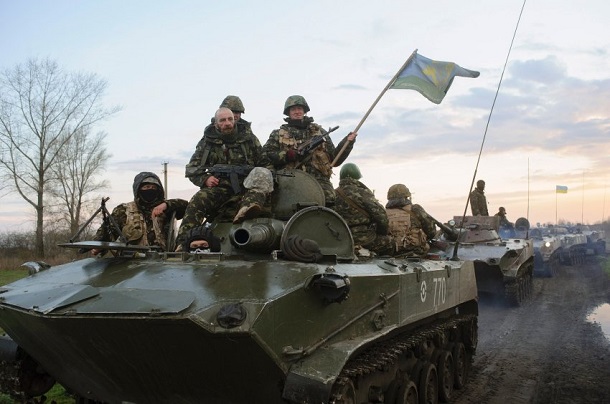Situation at Russia Border Growing More Tense
By LUKAS I. ALPERT and ALAN CULLISONBorder Agency Says Locals Have Attacked, Threatened Guards

Tensions rise as Ukraine's aditional military hardware continue to pulls up to eastern regions bordering with Russia
Ukrainian authorities said Tuesday that the situation along the country's border with Russia grew more unstable in the last week, with local pro-Russian residents attacking border guards or trying to intimidate them into changing allegiances.
The Ukrainian government has pressed forward with a military offensive in the east to quell a pro-Russian insurgency, but Kiev is increasingly losing its grip in the eastern regions of Luhansk and Donetsk, which both border Russia.
Aggression by pro-Russian residents has become more frequent since the start of the month, State Border Guard Service spokesman Oleg Slobodyan said, with two attempts to attack border guards and take their guns on Monday. "Groups of local citizens threaten the border guards, saying that they must switch over to the side of the separatists," he said. (Track the latest conflict in an interactive map.)
Ukraine and the West have blamed Russia for instigating the revolt in the east, a charge Moscow has denied, but Russia has tens of thousands of troops stationed along the border and has said it reserves the right to intervene in Ukraine if it feels ethnic Russians living there are under threat.
Mr. Slobodyan said "provocative Russian military movements" could be seen along the border late last week, but they had ceased in recent days. "The situation [along the border] is changing constantly," he said.
Ukraine is seeking to regain control ahead of presidential elections scheduled for May 25, while pro-Russian militants plan a May 11 referendum on the region's future in areas under their control. (Follow the latest updates on the crisis in Ukraine.)

Ukrainian soldiers stand guard at a checkpoint not far from Slovyansk, eastern Ukraine
Russian Foreign Minister Sergei Lavrov told journalists that his country wouldn't commit to recognizing the outcome of the Ukraine vote. He also said talks on de-escalation could only be possible if representatives from the pro-Russian separatists were included to have their "voice heard." Otherwise, "we will just go around in circles," he said.
Mr. Lavrov's Ukrainian counterpart Adrii Deschytsia rejected the idea of including the separatists in any talks.
"We [Ukrainian government] are recognized as the legitimate government of all people in Ukraine. Otherwise, we may as well have people from wherever Russia wants," Mr. Deschytsia following a meeting of the Council of Europe in Vienna.
In Kiev, Ukraine's parliament held a special closed session to hear a report from security chiefs, amid concerns that the violence could spread into the capital in an attempt to disrupt the elections. Members of Ukraine's Communist faction in parliament, who openly express Russian sympathies, weren't allowed into the session.
The head of the state Security Service, Valentyn Nalyvaichenki, said after the meeting that the government was urging Ukrainians to avoid Victory Day festivities on May 9—a celebration of the Soviet Union's defeat of Nazi Germany—as there were fears that separatists would seek to engineer provocations.
Kiev city officials have already canceled their Victory Day parade and officials in Odessa have sharply curtailed events that day as well.
The government has also set up some checkpoints around the borders of Kiev to question incoming motorists, and aides to the government say security services have broken up at least one group planning an assault and seized automatic weapons in a recent raid on an apartment.
The uncertainty comes as violence has grown. Officials said Tuesday that 30 insurgents and four government soldiers were killed in an operation the day before in the rebel stronghold of Slovyansk, in the most sustained fighting since the beginning of the government's military operation in the east three weeks ago.

Pro Russian rebel fighters in Slovyansk.
Meanwhile, flights to and from Donetsk International Airport, some 120 kilometers south of Slovyansk, were temporarily suspended on the orders of the Kiev government before being resumed in the afternoon, the airport said. A spokesman provided no details on the reason for the move.
Officials also ordered all schools closed around the region on Tuesday as the military operation continued, the Interfax news agency reported.
The Interior Ministry said that a local police precinct commander in the city of Horlivka was shot and kidnapped after a car he was riding in was fired upon. In Luhansk, a group of 20 armed militants attacked and burned down a radar station and seized several firearms, the regional prosecutor general's office said.
The increasingly deteriorating security conditions come following the deadliest day of fighting on Friday, when 46 people were killed in rioting and a deadly fire in the previously relatively calm Black Sea port city of Odessa.
In response to the riots between a pro-Russian mob and supporters of the new government, Acting President Oleksandr Turchynov on Tuesday dismissed the head of the Odessa regional administration. Kiev has already fired the chief of the regional police and much of his senior staff following the clash.

A protester throws a petrol bomb at the trade union building in Odessa May 2, 2014 (Reuters)
The speaker of the lower house of Russia's parliament called the deadly fire in Odessa genocide, the Interfax news agency reported Tuesday.
Sergei Naryshkin is one of the highest-ranking Russian officials to use such strong language when publicly condemning the deadly clashes. "We are dealing with real genocide, a genocide of Russian and Ukrainian people in today's 21st century," he said.

No comments:
Post a Comment